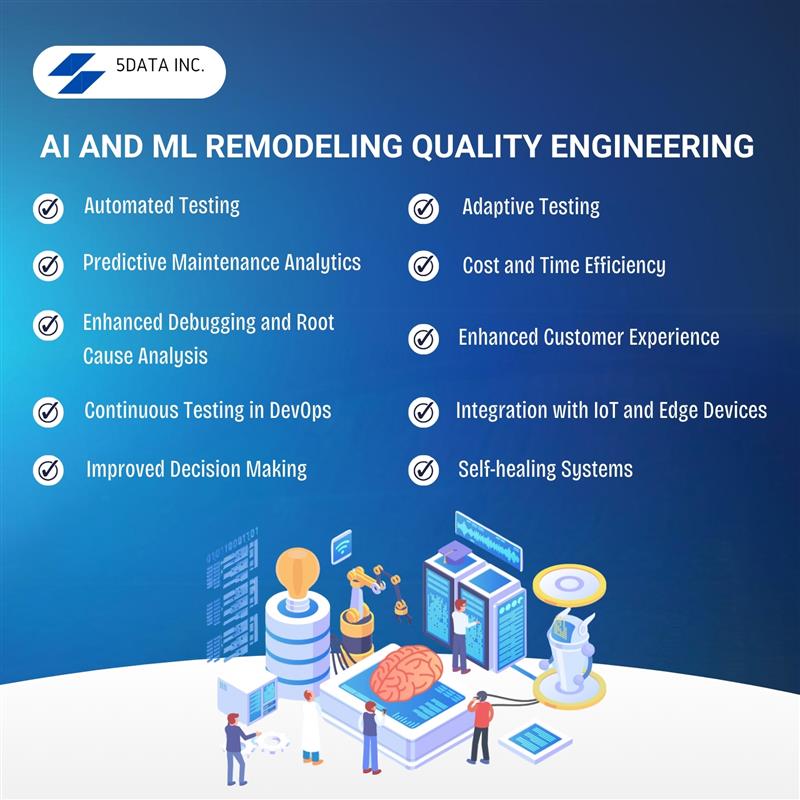Quality engineers must proactively embrace these technological advancements and lead the charge in redefining the future of quality engineering, ensuring they remain at the forefront of innovation and industry standards.
Key Takeaways
- AI and machine learning have revolutionized quality engineering practices, making testing and quality assurance more efficient and effective than ever before.
- AI-powered test automation has the potential to significantly enhance test coverage and streamline the testing process by reducing the time and effort involved.
- AI algorithms can produce synthetic data that closely resembles and is relevant to real-world situations.
AI And ML Remodeling Quality Engineering
AI and Machine Learning (ML) are undeniably transforming the field of quality engineering by enhancing testing processes, improving product quality, and accelerating the software development project and cycle time-to-market. Here’s how:
1. Automated Testing:
- Test automation: AI-powered tools can automate repetitive testing tasks, reducing the need for human intervention. Functional testing services include unit tests, regression tests, and more complex scenarios.
- Smart test case generation: AI can analyze the application and automatically generate test cases, ensuring comprehensive coverage with minimal effort.
2. Predictive Maintenance Analytics:
- Predictive defect analysis: Machine Learning algorithms can analyze past data to detect where defects are likely to occur, allowing teams to focus on high-risk areas.
- Test optimization: AI can determine the most critical tests to run on vast datasets based on historical defect data, reducing test cycles without compromising on quality.
3. Enhanced Debugging and Root Cause Analysis:
- Anomaly detection: AI algorithms can detect anomalies in software behavior during testing, helping to identify patterns that manual testers might miss.
- Automated root cause analysis: Machine learning can help maintenance tasks trace defects back to their root causes by analyzing patterns in the data.
4. Continuous Testing in DevOps:
- Integration with CI/CD pipelines: AI-driven tools can integrate with Continuous Integration/Continuous Deployment (CI/CD) pipelines to ensure continuous testing and monitoring, speeding up the development process.
- Real-time quality monitoring: AI can monitor the system in real-time and provide insights into quality metrics, enabling quick adjustments.
5. Improved Decision Making:
- Data-driven insights: AI can analyze huge stacks of data from various testing phases to provide actionable insights, helping teams make informed decisions about releases.
- Risk-based testing: Machine Learning models can assess risks based on code changes and guide the testing focus, ensuring critical functionalities are thoroughly tested.
6. Adaptive Testing:
- Learning from feedback: AI systems can learn from previous test results and user feedback to adapt testing strategies over time, continuously improving the quality assurance process.
- Dynamic test plans: AI can create and modify test plans in real time based on evolving project requirements and test outcomes.

7. Cost and Time Efficiency:
- Reduction in manual effort:AI automates repetitive tasks, avoiding the need for extensive manual testing and leading to cost savings.
- Faster time to market: AI optimizes the testing process, allowing products to be released faster and giving companies a competitive edge.
8. Enhanced Customer Experience:
- Personalized testing: AI can simulate user behavior more accurately, leading to more personalized and customer-centric quality assurance.
- Better end-user experience: By catching more defects during the development cycle and optimizing performance, AI ensures a better overall user experience and improves the standards of complex production processes.
9. Integration with IoT and Edge Devices:
Testing AI in real-time environments: AI can simulate and test software in real-time data analysis on IoT and cutting-edge technologies, ensuring it functions correctly in real-world conditions. These operations can be executed carefully with the assistance of a performance testing company.
10. Self-healing Systems:
Automated recovery: AI can identify and fix minor issues automatically without human intervention, leading to more resilient systems.
By integrating AI and ML into their quality engineering teams, companies can significantly enhance their testing process optimization processes, leading to higher quality products, faster delivery times, and reduced costs. The shift towards AI-driven quality engineering is transforming the industry and setting new standards for software development.
Overcoming Challenges in AI-Driven Quality Engineering
Data quality is a major concern when using AI in QA, requiring high-quality data for training and performance. Reliability concerns arise when testers are unsure about how AI works or its capabilities. Model bias is a potential issue, introducing defects through a selection of training data, test environments, test generation, algorithms, test scripts, visual testing itself, test execution, and evaluation methods.
Cost and complexity are significant challenges, requiring infrastructure, specialist knowledge, and computational demands.
The Future Of Quality Engineering With AI
Leveraging AI and machine learning is a paradigm shift in quality and security, software testing, and engineering practices. AI and ML can enable more efficient and effective software testing and quality assurance. AI-powered test automation can improve test coverage and reduce the time and effort required for all testing efforts. AI algorithms can generate synthetic data that is highly realistic and relevant to real-world scenarios.
Embracing the Future Of Quality Engineering
Quality engineers must adapt to the evolving technology trends and embrace digital transformation and artificial intelligence as the future of quality engineering. AI and ML can enable more efficient and effective software testing and quality assurance. AI-powered test automation can improve test coverage and reduce the time and effort required to test code quality itself. AI algorithms can generate synthetic data that is highly realistic and relevant to real-world scenarios. Top mobile performance testing services assist firms in adapting to these technical transformations.
Conclusion
AI and ML are transforming quality engineering practices, enabling more efficient and effective continuous testing and quality assurance. AI-powered test automation can improve test coverage, automate testing, and reduce the time and effort required for testing. AI algorithms can generate synthetic data that is highly realistic and relevant to real-world scenarios. Quality engineers must adapt to the changing landscape of technology trends and embrace the future of continuous testing and data quality in engineering.
Frequently Asked Questions
How is AI used in quality engineering?
AI enhances quality engineering by enabling automated testing, which increases accuracy, reduces costs, and minimizes human error.
How is Artificial Intelligence and machine learning used in engineering?
AI and ML drive the development of autonomous systems, improving engineering processes by analyzing large datasets and optimizing operations.
How are AI and ML transforming data quality management?
AI and ML automate error correction and routine tasks, improving data accuracy and efficiency while reducing manual effort.

